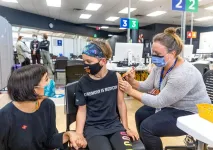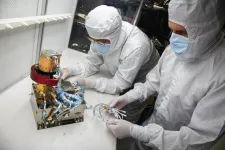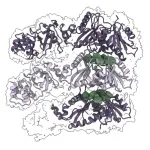(Press-News.org) MINNEAPOLIS/ST. PAUL (10/2/2024) — The University of Minnesota Medical School recently received a five-year, $3.2 million R01 grant from the National Institute of Arthritis and Musculoskeletal and Skin Diseases for a project that will study the epigenetic factors of low back pain. Low back pain affects 619 million people globally and is the single leading cause of disability worldwide, according to the World Health Organization. This chronic pain impacts people of all ages and can affect quality of life and mental well-being.
Epigenetics refers to biological processes that affect how genes work without altering the DNA itself. These changes can happen due to lifestyle factors like diet and exercise, as well as environmental influences like stress and aging. Despite early progress in this expanding field, the role of epigenetics in the causes that drive chronic pain remains largely unknown and treatment options are limited.
“Current treatments for individuals suffering with chronic back pain typically provide inadequate relief, require exposure to harmful drugs — like opioids — or invasive surgery,” said Laura Stone, PhD, professor at the U of M Medical School. “This project will explore a completely new approach to understanding and treating back pain. We hope to harness epigenetic mechanisms that are already used by the body to prevent or reverse chronic pain.”
Low back pain can develop from degeneration or herniation of the intervertebral discs in the spine. Disc degeneration is caused by pathological changes in gene expression that can lead to structural breakdown, inflammation and increases in nerve activity that signals pain into the nervous system.
This project aims to determine the role of epigenetic reprogramming in disc degeneration and chronic back pain to identify new treatments that target these issues. Rather than examining just one gene, the research team will use advanced technology available at the U of M Genomics Center to determine the role of all genes in this process. This information will help the research team identify and then test better ways to treat back pain.
The project officially began in early September.
-30-
Co-investigators on this grant include Drs. Scott Thompson, Peter Lee and Arin Ellington in the Medical School; Dr. Chris Faulk in the College of Food, Agricultural and Natural Resource Sciences; and Dr. Casey Johnson in the College of Veterinary Medicine
About the University of Minnesota Medical School
The University of Minnesota Medical School is at the forefront of learning and discovery, transforming medical care and educating the next generation of physicians. Our graduates and faculty produce high-impact biomedical research and advance the practice of medicine. We acknowledge that the U of M Medical School is located on traditional, ancestral and contemporary lands of the Dakota and the Ojibwe, and scores of other Indigenous people, and we affirm our commitment to tribal communities and their sovereignty as we seek to improve and strengthen our relations with tribal nations. For more information about the U of M Medical School, please visit med.umn.edu.
END
U of M Medical School receives $3.2M to study drivers of chronic low back pain
2024-10-02
ELSE PRESS RELEASES FROM THIS DATE:
UT Health San Antonio School of Nursing’s Caring for the Caregiver program earns national award
2024-10-02
SAN ANTONIO, Oct. 2, 2024 – The Caring for the Caregiver Program (C4CP) of the School of Nursing at The University of Texas Health Science Center at San Antonio (UT Health San Antonio) has earned a national award for its comprehensive education and support for families living with dementia.
The 5TH Annual Maude’s Awards were announced in Seattle, rewarding innovations that enrich the quality of life for persons living with Alzheimer’s disease and related dementias, as well as their care partners. The award was created in 2019 by Richard Ferry, co-founder of management consulting firm Korn Ferry International, ...
People infer the past better than the future, study finds
2024-10-02
If you started watching a movie from the middle without knowing its plot, you’d likely be better at inferring what had happened earlier than predicting what will happen next, according to a new Dartmouth-led study published in Nature Communications.
Prior research has found that humans are usually equally good at guessing about the unknown past and future. However, those studies have relied on very simple sequences of numbers, images, or shapes, rather than on more realistic scenarios.
"Events in real life have complex associations relating to time that haven't typically been captured in past work, so we wanted to explore how people make inferences ...
Sexual and gender minorities more likely to experience life dissatisfaction, isolation, stress
2024-10-02
FOR IMMEDIATE RELEASE
Wednesday, October 2, 2024
Contact:
Jillian McKoy, jpmckoy@bu.edu
Michael Saunders, msaunder@bu.edu
##
Sexual and Gender Minorities More Likely to Experience Life Dissatisfaction, Isolation, Stress
A new study found that sexual and gender minority adults in the US were more likely to report multiple social risk factors than heterosexual and cisgender adults, highlighting the need for policies that advance the health and socioeconomic well-being of these groups.
Until last year, few national surveys collected information about the prevalence of social risk factors—individual-level adverse experiences such as food insecurity ...
In surgery for localized muscle-invasive bladder cancer, extended lymph node removal offers no survival benefit but does increase morbidity
2024-10-02
The SWOG S1011 randomized phase 3 trial found no significant improvement in disease-free or overall survival but a higher rate of grade 3-4 adverse events and an increased risk of death in the 90 days after surgery. The findings, published in NEJM, should establish a standard bilateral pelvic lymphadenectomy that includes the external and internal iliac and obturator nodes as the standard of care for these patients.
Final results from the SWOG S1011 randomized phase 3 clinical trial, just published ...
“Nature-First Cities”, a new book explores how to invite nature back home, without evicting people
2024-10-02
A new book from Cam Brewer, Herb Hammond and SFU Resource and Environmental Management director, Sean Markey explores a nature-directed approach to stewardship that enhances cities, restores our relationships with nature and helps to rebuild our relationships with each other.
Situated in the understanding that both people and nature belong in urban spaces, and guided by principles of nature, equity and density, Nature- First Cities offers a vision for reestablishing our relationship with nature in cities.
This book is of particular interest to urban planners, ...
Health care site- and patient-related factors influencing COVID-19 vaccination completion rates
2024-10-02
The COVID-19 vaccine, introduced in December 2022, played a critical role in reducing mortality and morbidity related to the pandemic globally. Yet, by 2023, only 70% of the US population had completed the primary vaccination series. While factors such as race/ethnicity, socio-economic status, geography and political affiliations have been linked to vaccination rates, its relationship with characteristics of health care delivery sites like community health care centers (CHCs), has not been explored. CHCs, which provide comprehensive primary care to low-income populations, including COVID-19 vaccines, are key players in ...
SwRI-built solar wind plasma sensor to help track space weather
2024-10-02
SAN ANTONIO — October 2, 2024 —The Southwest Research Institute-developed Solar Wind Plasma Sensor (SWiPS) has been delivered and integrated into a National Oceanic and Atmospheric Administration (NOAA) satellite dedicated to tracking space weather. SWiPS will measure the properties of ions originating from the Sun, including the very fast ions associated with coronal mass ejections that interact with the Earth’s magnetic environment.
NOAA’s Space Weather Follow On-Lagrange 1 (SWFO-L1) satellite will orbit the Sun at ...
Filament structure activates and regulates CRISPR-Cas ‘protein scissors’
2024-10-02
CRISPR-Cas systems help to protect bacteria from viruses. Several different types of CRISPR-Cas defense systems are found in bacteria, which differ in their composition and functions. Among them, the most studied proteins today are Cas9 and Cas12, also known as DNA or ‘gene scissors’, which have revolutionized the field of genome editing, enabling scientists to edit genomes and correct disease-causing mutations precisely.
Researchers from the Institute of Biotechnology at the Life Sciences Center of Vilnius University – ...
Environmental quality of life benefits women worldwide
2024-10-02
Global evidence has revealed that women’s environmental quality of life is key to their overall quality of life and health, according to a study published October 2, 2024, in the open-access journal PLOS ONE by Suzanne Skevington from the University of Manchester, U.K., and colleagues.
Gender inequalities in health-related quality of life are generally few and small, even in large surveys. Yet many generic measures limit assessment to quality of life overall and its physical and psychological dimensions, while overlooking internationally important environmental, ...
Satisfying friendships could be key for young, single adults’ happiness
2024-10-02
A new analysis assesses the heterogeneity of factors linked with happiness among single Americans who are just entering adulthood, highlighting a particularly strong link between happiness and satisfying friendships. Lisa Walsh of the University of California, Los Angeles, U.S., and colleagues present these findings in the open-access journal PLOS ONE on October 2, 2024.
Prior research suggests that Americans in their early 20s may be less happy, on average, than at other points in their lives. Meanwhile, a growing percentage of young adults are not in long-term romantic relationships, and researchers are increasingly studying single people as a distinct ...





